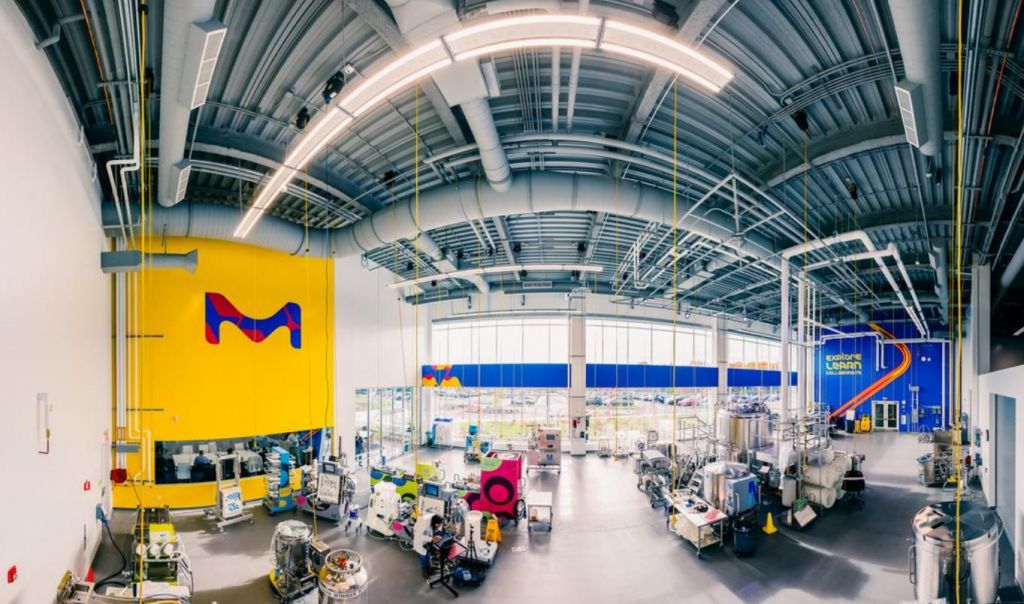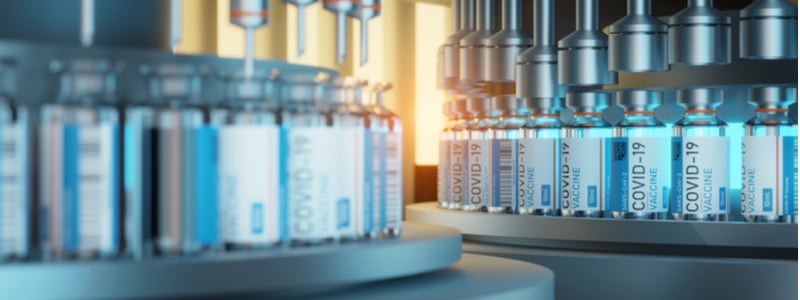Vaccines are among the most effective ways to improve and protect human health. Whereas vaccines in Europe and North America are regarded as part of the general medical plan, vaccine supply has always been a pressing issue in African countries. In the current Covid-19 pandemic, the ability to develop and manufacture vaccines in Africa instead of depending on vaccine imports is more critical than ever.
Setting up the logistics and cold chain infrastructure needed for vaccine deployment is expensive and cumbersome, contributing to low vaccination rates in African countries. Enabling local vaccine manufacturing in sufficient quantities and consistent quality could have a significant impact in fighting infectious diseases, including the Covid-19 pandemic.
A partnership between the biotech companies TechnoVax in the US, Merck, and Innovative Biotech in Nigeria aims to empower vaccine development in Africa. Innovative Biotech has already developed vaccines against Ebola and HIV, and with the onset of the Covid-19 pandemic, the company quickly switched to the new target.

“When we first met the Innovative Biotech team, they needed a partner for production and fill and finish services for a Covid-19 vaccine. In the long run, they were looking for more sustainable production activities, including full-service manufacturing in Nigeria,” said Youssef Gaabouri, Head of Sales of Middle East and Africa, BioProcessing at Merck*.
Emerging biotech matchmaking
It turned out that the ideal partner was already part of Merck’s global emerging biotech program, set up to nurture and help advance start-ups to the clinic in an integrated approach. TechnoVax, based in New York, is one of the companies supported in this program and one of the 2019 Emerging Biotech Grant winners. Both Innovative Biotech and TechnoVax use a specific approach to vaccine development known as virus-like particle technology.
Virus-like particle vaccines have become well-established over the last decades, for example, by protecting against the human papillomavirus and hepatitis B virus. They mimic the surface of live viruses, presenting viral surface proteins to the human immune system.
As a result, antibodies and T cells are produced, and memory cells form that can quickly start an immune response in case of an infection. Virus-like particles are not infectious because they do not contain any viral genetic material, making them safe to use.

“When we connected the two companies, they engaged right away. TechnoVax had already established a virus-like particle-based vaccine development and manufacturing platform, and we were working with them on scaling up their production process,” said Naomi Baer, Business Development Consultant for Emerging Biotech at MilliporeSigma North America.
Now, TechnoVax has become Innovative Biotech’s partner for vaccine development and manufacturing.
Scaling up virus-like particle vaccine manufacturing
Virus-like particle production is usually done in cells, and the removal of cellular components — membranes, proteins, and nucleic acids — is one of the crucial steps of the manufacturing workflow. Optimal filtration, clarification, and purification procedures are first evaluated on a small scale and then scaled up under established Good Manufacturing Practices (GMPs, WHO good manufacturing practices for biological products, Annex 2, Nov 2016).

“We participated in two on-site trials at TechnoVax in 2019, where we first optimized protocols for cell lysis, nucleic acid removal, and clarification. As a next step, we worked on purification processes including tangential flow filtration and chromatography methods to convert their bench-scale procedures to a GMP-compatible, scalable process, yielding virus-like particle preparations in the quality and quantity required for clinical trials,” Baer explained.
Because most of the optimization was done on-site, the Merck experts could demonstrate the new processes step by step and provide collaboration, training, and support to the TechnoVax team.
“When Covid-19 had us all sheltering in one place, we provided virtual training and online consultations to discuss results and next steps,” Baer added.
Paving the way to vaccine self-sufficiency in African countries
As a result of the combined efforts, TechnoVax was able to develop and produce an effective Covid-19 vaccine in sufficient quantity to start clinical trials in South Africa, Ghana, and Nigeria. TechnoVax plans to achieve emergency use authorization in these countries and from the FDA, EMA, and WHO.
“We engaged our consultants, process validation engineers, and regulatory experts from our BioReliance® team to connect TechnoVax to an FDA consultant, helping to accelerate the regulatory process,” Baer said.
As a next step, virus-like particle production shall be established in Nigeria to produce not only the Covid-19 vaccine but also additional vaccines needed in the region, including Ebola and HIV vaccines.

“Working on quickly adaptable manufacturing platforms rather than individual vaccines eases process development and accelerates market access for any new disease target. We believe that this project can serve as a proof of concept that triggers other projects in African countries, promoting self-sufficiency for vaccines and pharmaceutical products,” added Jérôme Dalin, Senior Consultant, EMEA Traditional Modalities – BioProcessing Strategy Operationalization at Merck.
Networking for success
Being part of Merck’s emerging biotech has allowed both TechnoVax and Innovative Biotech to speed up their projects while saving time and money and mitigating risks. In addition, finding the ideal collaboration partner so quickly was a significant stepping stone for their success.
And the two companies are not the only emerging biotechs to benefit from the network.
“We engage with hundreds of start-ups every day, providing services or helping them do it on their own. Our various teams support emerging biotechs by speeding up drug development from process to regulatory approval and manufacturing design,” Baer stated.
If you would like to be contacted regarding Merck’s next Emerging Biotech Grant Program, please leave your details. Or, visit our website to learn more about how Merck can accelerate drug and vaccine development, clinical trials, and biomanufacturing!
*The life science business of Merck KGaA, Darmstadt, Germany, operates as MilliporeSigma in the US and Canada. Merck, MilliporeSigma, and BioReliance are trademarks of Merck KGaA, Darmstadt, Germany, or its affiliates.
Header image via Shutterstock.com. All other images courtesy of Merck.
This article was originally published in February 2022.





